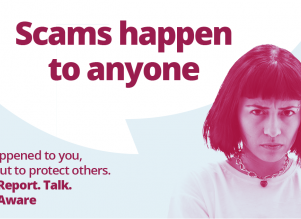Could the next scam victim be YOU?
I would firstly like to say that whilst writing this blog I received a call from an automated line telling me HMRC had a court judgement against me. We just can’t escape them!
(If you are unsure about something like this, contact the creditor e.g. HMRC, directly NOT using any information the automated voice tells you)
The past 12 months have been a breeding ground for scams – with 4.4 million fraud offences being reported and 36% of people being targeted in the first 3 months of the first lockdown.
Around half of those scammed were aged between 16 and 34.
You may think that you would know a scam if presented with one. Maybe you ignore the stream of scam emails and post that runs through your collective inboxes. Maybe you steer clear of all investment schemes. Maybe you report to Action Fraud and keep up to date with their reports.
But how about these?
- A man claiming he’s a policeman knocks on your door. He warns you of scams in the local area empting bank accounts and the safest thing to do would be to withdraw cash from your account and he’ll back tomorrow to your house to collect it. He’ll put it somewhere safe and return it to you. He seems concerned and like he wants to help
- Number starting with 0300 rings your mobile and they say they’re your bank and were concerned about some suspicious activity on your account. They seem official and go through security with you. You even get a text confirming. They ask you to transfer money into their safe account.
- You get a call stating you have a court judgement and must respond soon to avoid further action
- You get a call offering help with your broadband connection issues
All of the above are real scams and can happen to anyone, any age.
So what’s the best way to spot them?
● It seems too good to be true – like an email saying you’ve won a competition you don’t remember entering
● Someone you don’t know contacts you unexpectedly
● You’re being urged to respond quickly so you don’t get time to think about it or talk to family and friends
● You've been asked to pay for something urgently or in an unusual way – for example by bank transfer or gift vouchers
● You’ve been asked to give away personal information
Even if it does sound like your bank, we always recommend hanging up and ringing them back on a trusted number, such as from their website. If they claim to the police, phone the police to check. Genuine companies also usually know your name – scam emails instead will typically start with ‘Dear Sir or Madam’ or just your email address.
Remember:
● Don’t be rushed into making any quick decisions. It’s okay to take your time
● Never give money or personal details, like passwords or bank details, to anyone you don’t know, trust or have only met online. If someone pressures you for these, it’s most likely a scam
● Before you buy anything, check the company or website you’re using. Read reviews from different websites, search for the company’s details on Companies House, and take a look at their terms and conditions
● Pay by debit or credit card. This gives you extra protection if things go wrong
● Be suspicious. Scammers can be very smart. They can appear like a trusted business or government official, have a professional website and say all the right things. Take your time to work out if this is a real organisation. Ask them for ID or contact the organisation on a number you know and trust
● Make sure your antivirus software is up to date
● Keep your online accounts secure. Use a strong password for email accounts that you don't use anywhere else. Choosing three random words is a good way to create a strong and easy to remember password. You can also add in numbers and symbols.
● If you’re not sure about something, get advice from a trusted source, or discuss with family or a friend
If you’re certain of a scam – report it! By raising awareness we can help everyone avoid being another victim.
You can report scams to Action Fraud or to Citizens Advice Scams Action:
https://www.citizensadvice.org.uk/consumer/scams/reporting-a-scam/
https://www.actionfraud.police.uk/reporting-fraud-and-cyber-crime
If you’re on social media, share the word there too. Share any scam you've come across with us to help spread the word - @CABWyre on Twitter
This issue will sadly not go away anytime soon. Scammers are typically clever people who use sophisticated software and techniques to get you to part with your money - and they’re showing no signs of slowing down





